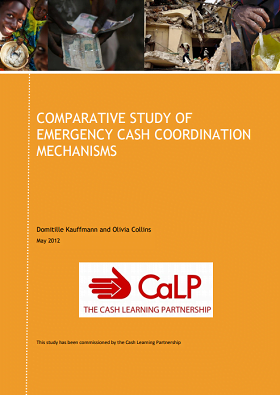Comparative Study of Emergency Cash Coordination Mechanisms
Based principally on three cases studies (Pakistan, Haiti, and the Horn of Africa), the objective of this comparative study is to draw on lessons learnt for better coordination of cash transfer programmes (CTP) in future emergencies.
This study has been commissioned by the CALP Network and conducted by Groupe URD.
It comes to the following conclusions:
- The place of cash coordination within the aid architecture: For coordination to be effective, it is recommended that technical discussions (about how to deliver cash) are separate from strategic coordination (about the extent to which needs are being met). While technical discussions need a cash-specific group, and can depending on the context remain independent, the strategic discussions need to be better integrated into the existing sector-based coordination (such as the clusters). The role cash coordination plays in linking longer-term social protection programmes to emergency response and vice-versa (to improve both “scaling-up” and “scaling-down”) should be reinforced.
- Strategic cash coordination : Cash is a way to meet needs rather than an end in itself, and this should be reflected in the way it is discussed within coordination. The principle of ‘coordinating by objective, not modality’ must underpin the integration into other coordination mechanisms.
- Technical cash coordination: The independence of technical working groups from the cluster coordination can create a more informal and inclusive atmosphere, which is conducive to sharing good (and bad) practice, amongst both larger and smaller organisations.
- Maximising resources for effective cash coordination ufficient resources are necessary in order to properly support cash coordination. This includes human resources and financial support to develop guidelines, conduct studies and evaluations, etc.
The study proposes a decision-making model for formalizing the integration of cash coordination mechanisms within the wider humanitarian system, which requires further discussions with other key stakeholders, particularly donors, the IASC and OCHA.



